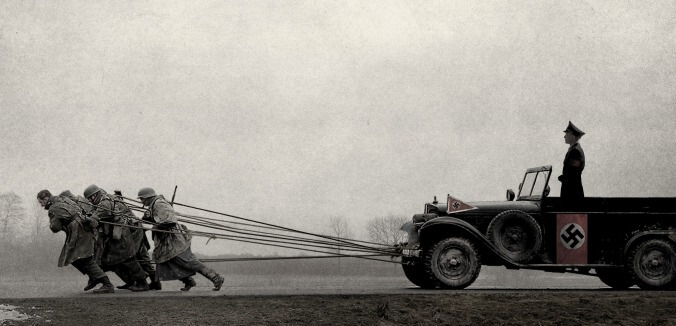The Captain is based on the true story of Willi Herold (Max Hubacher), one of the thousands of Nazi soldiers who abandoned their posts when it became clear that the war was over, and their side had lost. Fleeing through the German countryside, Herold miraculously stumbled upon an abandoned car containing a Nazi officer’s luggage, including a full dress uniform. Thinking quickly, Herold donned the uniform and began gathering soldiers he found wandering the countryside around him, organizing them into an impromptu unit and marching them into the Aschendorfermoor prison camp, where he told the officers on duty that he had come to inspect the camp on the orders of Hitler himself. A pretty clever plan to avoid being executed as a deserter, right?
Then the story takes a turn so dark, the only way to even begin to fathom it is to allow for the existence of evil. Writer-director Robert Schwentke, returning to his native Germany after a decade and a half wandering in the wilderness of Hollywood journeyman gigs, approaches these events with a nihilistic, pitch-black sense of humor, for scenes combining thrilling repartee and unchecked cruelty that play like Salò as directed by Armando Iannucci. Schwentke also remains vague as to whether Herold’s actions are a byproduct of his new uniform, à la the infamous Stanford prison experiment, or if he was already a psychopath who’s finally found circumstances amoral and chaotic enough for him to thrive.
One thing that’s not ambiguous is Schwentke’s commentary on how Willi Herold’s story, and the rise of the Nazi Party in general, reflect our current political moment. Schwentke’s observation that all you need to turn ordinary people into fascists is to tell them what they want to hear is an astute one. But the point is made in so many violent, unsettling ways, with so little variation on this basic psychological theme, that the brutality stars to feel crushingly repetitive. But the film is consistently beautiful to look at in an “industrial metal album cover” kind of way, pairing dimly lit, black-and-white cinematography and artfully composed mise-en-scéne—one shot of a group of soldiers pulling Herold in the back of a broken-down car evokes the iconic photo of U.S. Marines raising the flag over Iwo Jima, which cannot be a coincidence—with a grinding, metallic ambient score. The Captain is a bleak film, but then again, these are bleak times.

 Keep scrolling for more great stories.
Keep scrolling for more great stories.
